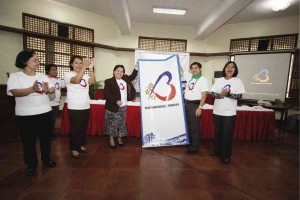Psychological first-aiders trained

AIMING to uplift the frayed spirits of disaster victims, PNU and Pasuc, with the NDRRMC and DSWD, launch the Burubligay Project.
The monster typhoon “Yolanda” a month ago, the killer earthquake that reduced Bohol and Cebu to shambles and the traumatizing Zamboanga siege all left many in a daze, stunned, shell-shocked. With these tests of the Filipino resilience, it is hard to expect the victims to spring back to life in no time.
Philippine Normal University (PNU) vice president for academics Adelaida Gines figured the victims would need more than the basic food and shelter. They also need someone to talk to.
“We know that climate change is here, it is now the reality… we cannot afford… to simply look and watch. We need concrete action,” Gines said.
So PNU and the Philippine Association of State Universities and Colleges (Pasuc) launched the Burubligay Project, a long-term psychosocial program that will train volunteer teachers and professionals in giving psychological first aid and deploy them to disaster-stricken areas. Burubligay is Waray for kapit-bisig that also “symbolizes volunteerism and communal solidarity.”
The first two-day training was held early this month. The next two training sessions will be conducted on Dec. 17-18 and Jan. 17-18.
Article continues after this advertisementThe psychosocial training at PNU is one of the project’s first steps. All the institutions and individuals who signed up for the training committed to train other professionals in their communities and to serve in future disaster response efforts.
Article continues after this advertisementHelping each other
Pasuc-member state universities and colleges (SUCs) in affected areas can fill out request for assistance forms and submit them to PNU. The university will then tap the volunteer institutions in Pasuc’s network for help.
The assisting school will pay for its transport expenses while the affected SUC will take care of board and lodging, a mechanism designed to make the project sustainable.
Given the hefty emotional toll involved in the project, trainees must have degrees or professions related to psychology or guidance and counseling. But even psychology teachers and guidance counselors admitted they were not ready to face grieving victims. They knew it would be a daunting task and they would be walking on eggshells.
There was, for instance, a student from Tacloban who transferred to a school in Pangasinan after Yolanda. A news report said when a teacher in her new school asked the girl to recite in class, the student broke down.
The first challenge, the trainees were told, is to zip the mouth, something quite hard to do for teachers whose job demands a lot of talking. After all, the last thing a traumatized person needs is a blabbermouth. But all the trainees agreed that listening was the most important skill a psychological first-aider should learn.
More than listening
And it was not just plain listening they were supposed to do. “We have to be attentive and we have to listen to them with empathy while maintaining eye contact,” Gines said. Eye contact was something very Filipino, she added, as it was a sign of sincerity.
Aiders should also use a nonjudgmental approach, Christian Cruz of Bulacan State University said.
Alfie de Vega, a PNU student who counsels people with HIV (the AIDS-causing virus), cited an experience with a fellow counselor. Although they were just supposed to share experiences, De Vega said he ended up feeling worse.
“I felt like I was being fixed,” he said, “when all I needed was just someone to talk to.”
Gines, who specializes in guidance and counseling, said being preachy never helps, especially with people trying to pick up what remains of their lives. “It’s really a big counseling no-no.”
Guidance counselor Evelyn Bagaporo said the psychosocial support team members should take themselves out of the situation and never impose what to do. “If I were in your position” statements would definitely be out.
“There are so many do’s and don’ts in administering psychological first aid (PFA), I am not sure whether I can do it but I will do it,” said Merry Ruth Gutierrez, director of the PNU’s
Graduate Research Office.
Administering PFA starts with the commitment to go out there and the promise to lend both ears and share a smile and a laugh, perhaps, although it seems difficult in heartbreaking situations.
But laughter yogi Paolo Trinidad said it was possible. Saying laughing was a science, he taught teachers how to laugh even in tragic circumstances.
“Put your four fingers under your navel, the palm has to be under the diaphragm, listen to the rhythm (of a beating drum) and do a hissing sound. That’s [to warm up the diaphragm],” he explained.
The hissing sound turns into he-he-he, each syllable coming from the diaphragm, he said.
“Then try to communicate.” He faced his audience, saying he-he-he, and then laughed. Instantly, the whole room was filled with laughter—full, boisterous, contagious and happy.
As Trinidad’s Pinoy Laughter Yoga website says, “[L]aughter [is more] than just the best medicine. It can heal the emotions and the spirit, as well.”
